How Many People in France Speak English?
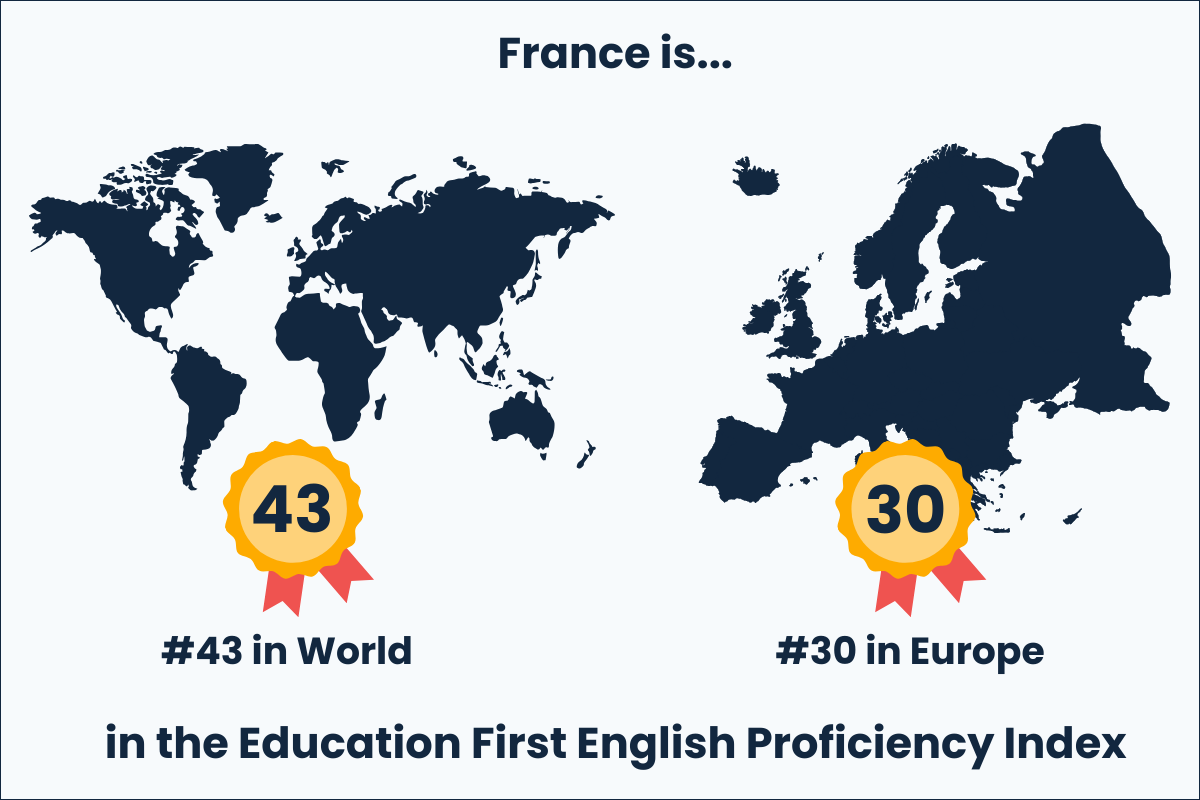
France is a large country with a rich linguistic landscape. The French language is the official language of the country, spoken by nearly the entire population. Linguists also estimate there are over 70 smaller regional languages of Latin, Germanic, and Celtic origin spoken throughout the country. But what about foreign languages, and English in particular?
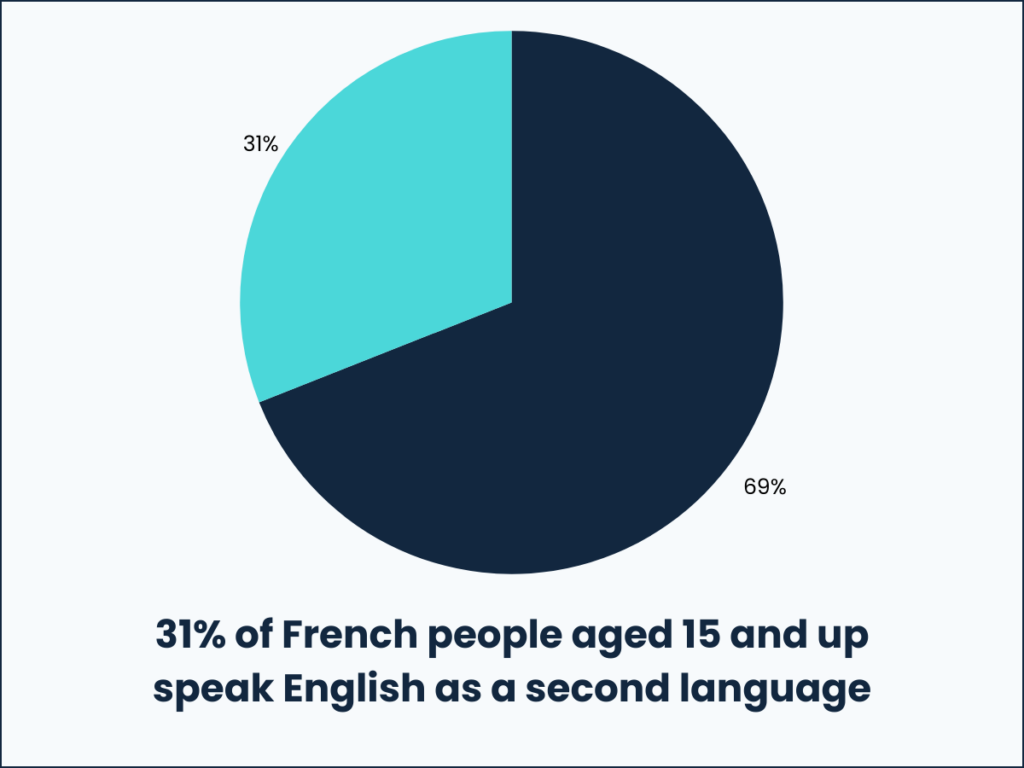
The French are often stereotyped as being stubbornly bad at speaking English. However, that’s neither fair nor correct to assume. In fact, according to the most modest estimates, 1 in 3 people in France speak English. The overall proficiency level has also been on the rise over the past few decades.
France still lags behind other European countries like Germany, the Netherlands, and Sweden. Yet a surprising amount of French people speak English, and even more people are showing interest in the language.
Overall, English language trends in France are positive. Keep reading to learn more about English statistics in France!
Number of English Speakers in France (General Stats)
France constantly makes news headlines for being “the worst in Europe” at speaking English, with stats to prove it. But what exactly does this mean? How widely spoken is English really, and how well do the French speak English? Let’s break down the numbers:
- Estimates about the total number of speakers vary. 31% of French people aged 15 and up speak English, according to a 2018 survey conducted by the French Ministry of Culture.
- Another survey done by Ipsos in 2019 shows better figures. 50% of French adults speak English well enough to hold a simple conversation. The survey had a sample of 1,505 people, and the level of English was self-reported.
- According to the same Ipsos survey, 31% of respondents said they spoke basic English, 15% said they spoke the language well, and 4% reported excellent English skills. Only 10% of respondents said they couldn’t speak any word in English.
- French people under 35 years old are the most likely to speak English very well. The level of proficiency is lower among older age groups. 1 in 2 adults between 35-59, and the majority of people over 60, reported bad English skills.
- People with a higher education and a higher socio-professional status were more likely to have good or excellent English.
- Most French people see the English language as an important skill. 67% of Ipsos respondents rated the English language as either important or essential in daily life, and 89% rated the language as either important or essential in educational pursuits.
- As per a 2012 Eurobarometer report, 92% of French respondents said that English is one of the most useful languages for a child’s future.
- According to the 2023 English Proficiency Index, France ranks #30 in Europe and #43 worldwide for English skills.
- France had an English proficiency score of 531 points, the equivalent of a B2 English level according to the CEFR.
- People aged 26-30 had the highest proficiency, with a score of 553 points.
- Paris is among the cities with the best English. Other cities topping the list in 2023 include Grenoble, Rennes, Brest, and Lyon.
- English proficiency in France improved drastically between 2011 and 2020. The average proficiency score in 2019 was 544, up 38 points since 2011. France reached a peak score of 559 points in 2020, but numbers have been declining by 10 points per year since the pandemic.
Overall, estimates place the share of English speakers at 30-50% of the French population, with people aged 18-35 being most likely to speak English very well.
The average proficiency level among English speakers in France is B2 (upper-intermediate). An upper-intermediate command of English implies a good understanding of the language and a reasonable degree of accuracy and fluency in speech.
France has considerably fewer English speakers and a lower average proficiency than other countries in the European Union. You can check out our other articles about top-ranking countries like Sweden and Germany to get an idea about how the countries compare.
However, in absolute terms, it seems that the French are not doing so badly after all. The majority of people in France might not speak English, but at least 1 in 3 and possibly up to 1 in 2 speak English well enough to communicate effectively in everyday situations.
Sources: Ministère de la Culture, Ipsos, Eurobarometer, Education First 1 & 2
English Speakers in France by Region
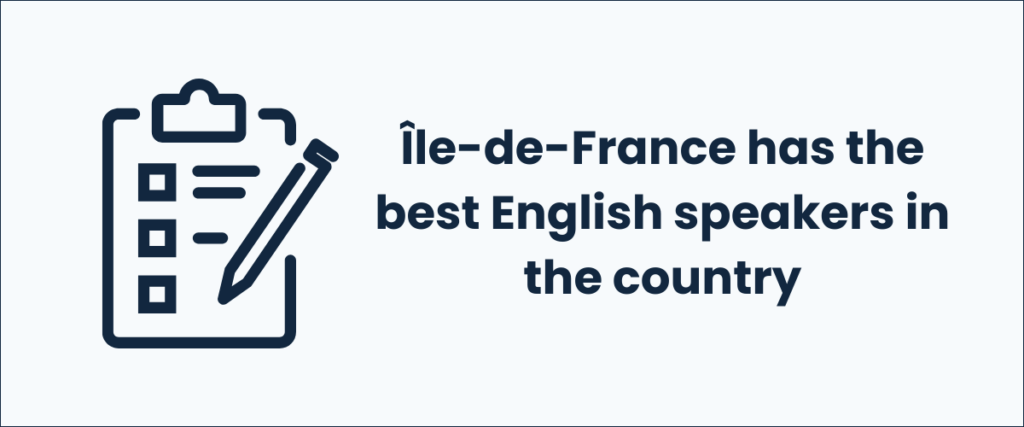
As the data shows, the people most likely to speak English in France are young, highly educated, and of higher socioeconomic status. Northern France overall has a lower median age than the South of the country, and northern regions top the OECD rankings in terms of jobs, income, or education.
With that in mind, the regions with the highest percentage of English speakers in France likely include:
- Île-de-France
- Hauts-de-France
- Pays de la Loire
- Bretagne
However, densely populated regions in the south (like Auvergne-Rhône-Alpes, Occitanie, and Nouvelle-Aquitaine) are also likely to have a large number of English speakers, including natives.
According to the National Institute of Statistics and Economic Studies in France, there were 230,491 native English speakers in France in 2014, with Brits making up the vast majority of English-speaking expats in the country.
Most of the native English speakers in France live in densely populated regions, including the capital and the south of the country. Here are the regions with the most expat residents:
- Île-de-France (59,390)
- Nouvelle-Aquitaine (43,833)
- Occitanie (31,676)
- Auvergne-Rhône-Alpes (23,351)
- Provence-Alpes-Côte d’Azur (17,932)
In terms of English proficiency, the regions in Northern France stand out with scores equal to or higher than the national average. The 2023 edition of the EPI offers scores for 16 regions. Here’s how they all compare:
| Region | English Proficiency Score | Proficiency Level |
| Île-de-France | 553 | High |
| Bretagne | 545 | Moderate |
| Provence-Alpes-Côte d’Azur | 541 | Moderate |
| Pays de la Loire | 530 | Moderate |
| Grand Est | 522 | Moderate |
| Auvergne-Rhône-Alpes | 522 | Moderate |
| Normandie | 521 | Moderate |
| Occitanie | 518 | Moderate |
| Hauts-de-France | 516 | Moderate |
| Nouvelle-Aquitaine | 509 | Moderate |
| La Réunion | 509 | Moderate |
| Centre-Val de Loire | 508 | Moderate |
| Bourgogne-Franche-Comté | 499 | Low |
| Guadeloupe | 489 | Low |
| Martinique | 465 | Low |
| Corse | 457 | Low |
Île-de-France was the only region classified as having high proficiency. Overall, it seems that Northern France has the most non-native English speakers, as well as higher average proficiency scores.
It’s worth noting that scores between 500-599 points are all equivalent to a B2 level on the CEFR scale. In other words, most of France can understand and speak English well enough to maintain a conversation on a wide variety of topics.
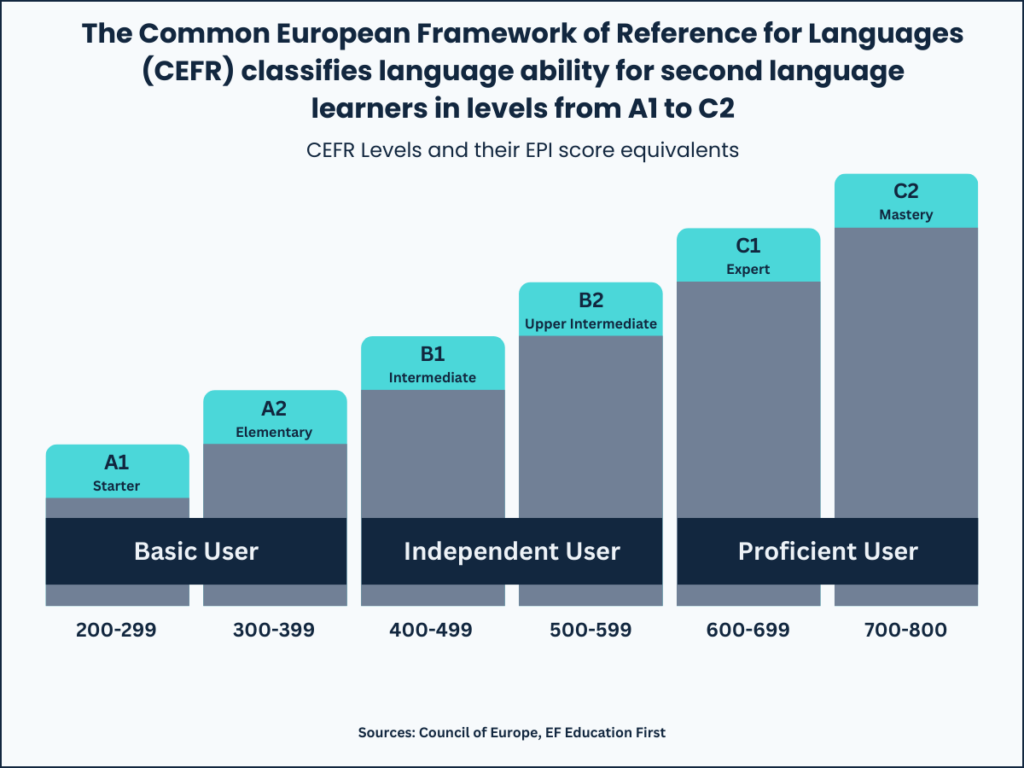
Sources: Eurostat, OECD, The Local, Education First
English Speakers in France by City
Statistically speaking, Northern France might have more English speakers and higher average proficiency scores. But on a city-by-city basis, large metropolitan areas all over the country are on an even playing field. It’s highly likely to find a decent English-speaking population in large cities, especially in places like:
- Paris
- Lyon
- Marseille
- Toulouse
- Bordeaux
Large and well-developed cities like Paris, Lyon, Toulouse, and others are well known for their large multinational companies, universities, museums, cathedrals, galleries, and more. There’s no shortage of opportunities and attractions to draw in English speakers from all over France (and the world).
Unsurprisingly, English is quite common in the large city centers, where people come for better education and career prospects. And of course, who could forget the well-developed tourism industry in Paris and other large cultural hubs in France? After all, France is the most visited country in the world.
The hospitality industry is well-adapted to meet the demands of millions of tourists each year. English is, of course, very important for people working in hotels, restaurants, museums, and other places frequented by foreigners in the country.
English proficiency in large French cities reflects these trends. All 24 cities included in the latest EPI edition had scores above the national average. The cities with the highest English proficiency scores in 2023 were:
- Grenoble
- Rennes
- Brest
- Paris
- Lyon
The rest weren’t far behind either. Here’s the full list of proficiency levels by city in 2023:
| City | English Proficiency Score | Proficiency Level |
| Grenoble | 590 | High |
| Rennes | 582 | High |
| Brest | 582 | High |
| Paris | 579 | High |
| Lyon | 576 | High |
| Strasbourg | 575 | High |
| Aix-En-Provence | 575 | High |
| Rouen | 575 | High |
| Dijon | 569 | High |
| Lille | 566 | High |
| Angers | 565 | High |
| Nancy | 562 | High |
| Clermont-Ferrand | 560 | High |
| Nantes | 557 | High |
| Tours | 556 | High |
| Marseille | 554 | High |
| Amiens | 554 | High |
| Montpellier | 553 | High |
| Toulouse | 551 | High |
| Nice | 549 | Moderate |
| Le Mans | 546 | Moderate |
| Reims | 545 | Moderate |
| Metz | 540 | Moderate |
| Bordeaux | 538 | Moderate |
As you can see, large cities tend to have great English skills. Chances are, every second or third person in Paris can speak English at a conversational level. The same applies to places like Lyon, Strasbourg, Rennes, and others. Things are different outside of the buzzing city centers, though.
Fewer people speak English outside of large metropolitan areas and tourist spots. As a general rule, the further away you go from the regional capitals, the fewer people know English. It’s highly unlikely to find a French person who speaks English in rural France.
Sources: Education First
English Speakers in France by Demographic Group
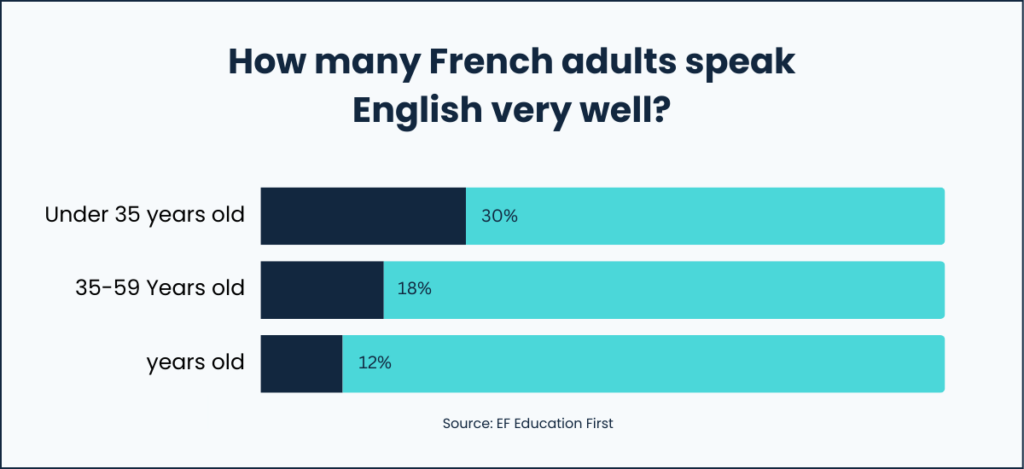
Young adults with a higher education are the most likely to speak good English. However, proficiency levels are slowly increasing across the board for the majority of demographic groups. Here’s what we know so far, according to the data:
- Both men and women have moderate English proficiency in 2023, with proficiency scores of 532 and 530, respectively.
- All age groups (18-41+) tested by Education First in 2023 had a B2 level on average.
- Adults aged 26-30 had the highest proficiency scores in 2023, followed by those aged 31-40, and 21–25-year-olds.
- English proficiency has been increasing across all age groups except for 18–20-year-olds. English proficiency in those under 20 has dropped by 33 points since 2020.
- In those aged 26-41+, the average scores have increased by an average of 68 points since 2015.
- A 2012 European survey on language competences shows that only 14% of French pupils reached an English level of B1 or higher by the end of secondary school. The majority of French teens had an A2 level in English and weren’t able to use the language independently.
- Roughly 30% of adults over 35 rate their English skills as “average.”
- 60% of those aged 60+ rate their English skills as bad or very bad. Only 12% consider their English to be good or excellent.
- At the same time, 1 in 2 French adults aged 35-59 thinks their English is bad or very bad, and only 18% view themselves as proficient.
Although proficiency levels have been increasing over the past few years, the majority of French adults still don’t speak fluent English. Those who do speak English, have an intermediate (B1-B2) level on average.
French teens have the lowest proficiency among English speakers, presumably because they’re still actively learning the language. Pupils in France typically start mandatory English classes in 6th grade (age 11), and study English for seven years, with an average of 3 hours per week of English instruction.
Many continue studying English during higher education. In fact, 10% of those with higher education reported good or excellent English skills, compared to 6% of those with a high school diploma.
Sources: Education First, Ipsos, JSTOR, SurveyLang
Conclusion
France is often thought to be among the worst countries in the EU at speaking English. Even the majority of people in France estimate that their country is either bad or very bad at English, according to public opinion surveys. Indeed, the majority of France’s population doesn’t speak fluent English. The average French native can only speak their own language.
But the truth is a bit more nuanced. Statistically, France has a lower English-speaking population than other countries in Western Europe. However, estimates show that roughly 1 in 2 young adults speak English at an intermediate level or above. The proficiency levels have also been increasing across most age categories over the past decade.
FAQs
Is it rude to speak English in France?
It’s not considered rude to speak English in France. If you’re a tourist, people don’t expect you to be speaking French. That being said, French attitudes towards English might vary. According to recent surveys, most French people are embarrassed with their English skills. The average native French speaker might only know a few words and basic phrases or they might not be used to spoken English.
Many might be reticent to talk to foreigners, especially if approached abruptly. It’s a good idea to learn basic French phrases to be able to introduce yourself and ask for help in French. You won’t need to know conversational French. Just knowing a few basic French phrases can definitely win people over.
Why isn’t English more widely spoken in France?
Most French people view the English language as important or even crucial for education and job opportunities, yet most people don’t know fluent English. According to the European Survey of Language Competences, there are a few factors that likely explain this.
Unlike other countries in Western and Northern Europe, French pupils start classes at a later age. The structure of the education system and the school curriculum in France are also different. Lastly, French children are less likely to get frequent exposure to the English language in daily life outside of school.
Can you visit France if you don’t speak French?
Definitely! Millions of visitors arrive in France every year and not all of them understand French. As one of the most visited countries on Earth, France has adapted to meet the demand of foreign tourists, many of whom don’t speak the local language. English is commonly spoken in large cities, especially around popular tourist destinations.
You can expect to find at least a few English speakers in large restaurants, hotels, souvenir shops, information offices, museums, and other tourist hotspots. Public services like transportation could be a bit tricky, though, so it’s good to have a dictionary like Google Translate on hand in case you encounter a language barrier.
Are there other foreign languages spoken in France?
All French pupils study their native language, plus a combination of two foreign languages. In most schools, students learn English as their first language (also known as L1). However, French pupils in lower secondary education are also taught a second language (L2). Spanish, German, and Italian are the most common options.
Before the end of WW2, the main foreign language taught in French schools was German. According to a 2012 Eurobarometer report, 13% of French people speak Spanish as a foreign language, and another 6% speak German. However, English is the most common foreign language spoken throughout the entire country.